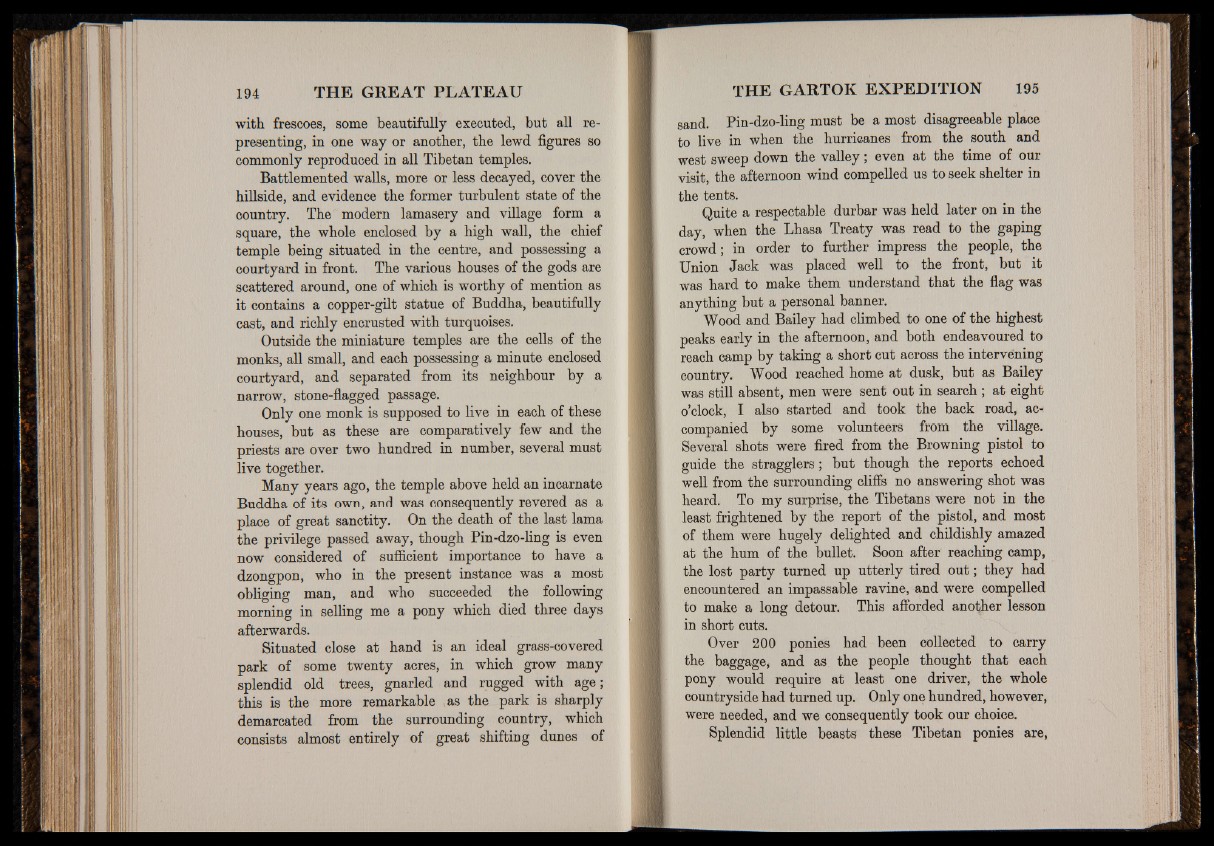
with frescoes, some beautifully executed, but all representing,
in one way or another, the lewd figures so
commonly reproduced in all Tibetan temples.
Battlemented walls, more or less decayed, cover the
hillside, and evidence the former turbulent state of the
country. The modern lamasery and village form a
square, the whole enclosed by a high wall, the chief
temple being situated in the centre, and possessing a
courtyard in front. The various houses of the gods are
scattered around, one of which is worthy of mention as
it contains a copper-gilt statue of Buddha, beautifully
cast, and richly encrusted with turquoises.
Outside the miniature temples are the cells of the
monks, all small, and each possessing a minute enclosed
courtyard, and separated from its neighbour by a
narrow, stone-flagged passage.
Only one monk is supposed to live in each of these
houses, but as these are comparatively few and the
priests are over two hundred in number, several must
live together.
Many years ago, the temple above held an incarnate
Buddha of its own, and was consequently revered as a
place of great sanctity. On the death of the last lama
the privilege passed away, though Pin-dzo-ling is even
now considered of sufficient importance to have a
dzongpon, who in the present instance was a most
obliging man, and who succeeded the following
morning in selling me a pony which died three days
afterwards.
Situated close at hand is an ideal grass-covered
park of some twenty acres, in which grow many
splendid old trees, gnarled and rugged with age;
this is the more remarkable as the park is sharply
demarcated from the surrounding country, which
consists almost entirely of great shifting dunes of
sand. Pin-dzo-ling must be a most disagreeable place
to live in when the hurricanes from the south and
west sweep down the valley; even at the time of our
visit, the afternoon wind compelled us to seek shelter in
the tents.
Quite a respectable durbar was held later on in the
day, when the Lhasa Treaty was read to the gaping
crowd; in order to further impress the people, the
Union Jack was placed well to the front, but it
was hard to make them understand that the flag was
anything but a personal banner.
Wood and Bailey had climbed to one of the highest
peaks early in the afternoon, and both endeavoured to
reach camp by taking a short cut across the intervening
country. Wood reached home at dusk, but as Bailey
was still absent, men were sent out in search; at eight
o’clock, I also started and took the back road, accompanied
by some volunteers from the village.
Several shots were fired from the Browning pistol to
guide the stragglers; but though the reports echoed
well from the surrounding cliffs no answering shot was
heard. To my surprise, the Tibetans were not in the
least frightened by the report of the pistol, and most
of them were hugely delighted and childishly amazed
at the hum of the bullet. Soon after reaching camp,
the lost party turned up utterly tired o u t; they had
encountered an impassable ravine, and were compelled
to make a long detour. This afforded another lesson
in short cuts.
Over 200 ponies had been collected to carry
the baggage* and as the people thought that each
pony would require at least one driver, the whole
countryside had turned up. Only one hundred, however,
were needed, and we consequently took our choice.
Splendid little beasts these Tibetan ponies are,